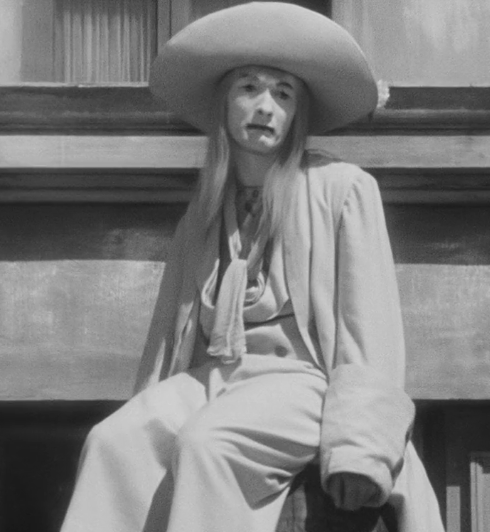0. The Fool
My Thoughts
The Fool is a card I really resonate with because it is me, all of the time.
Pavlov's interpretation of the Fool is really interesting to me--it does not feel as silly or naive as the Smith-Waite equivalent. Where the Smith-Waite Fool seems to be so lost in his own thoughts that he does not see he is about to walk off the side of the cliff, the Pavlov Fool seems self-aware and self-possessed. They move with conscious purpose, aware of the role they must play in the story ahead. They're less naive and more surrendering to the absurdity of life.
The added element of the mask is big for me here. I see another level of this card as being the innocent state of self--who I am at my core, beneath the damage that's shaped me, beyond the roles I've felt I had to play throughout my life.
I'm interested in the white roses in the Fool's hair here, too. They remind me of the roses in the Strength and Death cards--though they're wine red on the Strength card and a dark violet on Death. There's a sense of staining here, the petals darkening as the Fool moves through the hardships of life and into death, but the flowers are still beautiful in their transformed states, perhaps even more so.
Traditional Reading
Biddy Tarot lists the keywords "Beginnings, innocence, spontaneity, a free spirit" under their description of the Fool.
Traditionally, the Fool is read as the hero of the story played out in the Major Arcana.
Personal Associations

Baptiste, from Children of Paradise: Pavlov's depiction of the Fool as a Venetian Pierrot reminded me of Baptiste as soon as I first saw the card. In the film, Baptiste is a mime who falls in love with the courtesean Garance. Of all the men who love Garance, Baptiste is the only one who seems to ever truly win her affection--but in the end, he couldn't love her without wanting to own her, so she leaves him as she does all the rest. Baptiste at the start of the film is the perfect Fool, his heart so open that he falls for Garance in an instant. In his most innocent state, Baptiste could perhaps love her without attachment--but in this case, the Fool could not remain free of the world's corrupting influence.

Orpheus, as imagined in the musical Hadestown: The story of Orpheus and Eurydice mirrors that of the Major Arcana in a lot of ways. Hadestown presents the myth as a sad song sung again and again, the outcome always known, but the hope that things could be different forever present. Orpheus plays the romantic who will always believe in chasing love at any cost, but who always fails in the same way, unable to surrender fully to faith in Eurydice's love.
